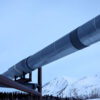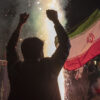Just eight days before a U.S. missile successfully shot down a damaged U.S. spy satellite on February 20, China and Russia submitted a draft treaty to ban weapons from space to the U.N. Conference on Disarmament in Geneva. China claims to want to avoid the unnecessary “weaponization” of space, but there actions clearly demonstrate otherwise.
On January 11, 2007 China launched a unannounced anti-satellite (ASAT) test and then followed it up with two straight weeks of steadfast denial. The operation littered outer space with debris that will orbit Earth for centuries and endanger peaceful space operations for years to come. China recognizes they will not be a “peer competitor” of the U.S. military for several decades and therefore is seeking to acquire weapons that can target U.S. weaknesses. Beijing believes that having the capacity to target U.S. space assets will make the American leaders more reluctant and less capable of challenging China on the battlefield. That is why the draft treaty submitted by China does not even address ground-based systems like the one they used last January.
The defensive approach behind the U.S. ASAT mission contrasts greatly with China’s aggressive intentions. The U.S. announced their attempt long before it actually occurred and was quick to offer foreign countries, including China, data from the mission. The care the U.S. took in conducting this operation reflects the fundamentally defensive and non-aggressive purpose of a damage limitation strategy. The operation mitigated, if not eliminated, the potential effects of hazardous chemical fuel on board the satellite, and any long-term space debris is believed to have been destroyed.
China’s ASAT test was a military exercise designed to demonstrate its ability to execute an aggressive strategy of asymmetric warfare. As such, it does not compare to the transparent and necessary actions taken by the United States in the face of pending humanitarian danger. In addition to the serious difficulties in defining “space weapons” and verifying compliance, China’s power ambitions cast sever doubt on the sincerity of its commitment to a space treaty.
Quick Hits:
- Despite the most “the most sweeping ethics reform since Watergate” the new Democratic majority has been good for K Street’s bottom line.
- Those who had hoped Fidel Castro’s resignation from leadership would mark a dramatic change were dealt a blow Sunday when the National Assembly bypassed a younger generation of politicians and named Fidel Castro’s brother, Raul, president and a hard-line communist first vice president.
- An Iraqi interpreter living in the U.S. since last September will soon be returning to Iraq; this time as an enlisted member of the U.S. Army.
- Iran confirmed U.N. reports that it is now using new centrifuges that can churn out enriched uranium at more than double the rate of the machines that now form the backbone of the Islamic nation’s nuclear program.
- The IAEA reported Friday that “alleged studies” into high-explosives testing and design of a missile reentry vehicle “could have a military nuclear dimension.”



























